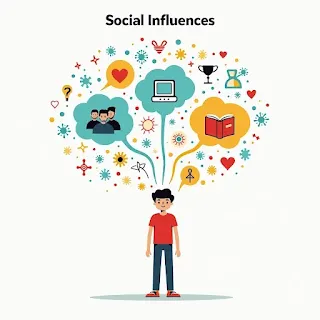Concept of Self
All of us have our different emotions, feelings and beliefs that who are we? What do we like? How do we develop? The answer of these questions are not related with our birth or later learning and training by social interaction and reactions and making a concept of our self. We have consciousness in contrast to animals to determine our aims. Self-concept is an undefined thing but we cannot separate this from ourselves because it is a consequence of social interaction, response to that action.
The Emergence of Self-Concept
1. Theory of George Herbert Mead (1965-1931) :
In the opinion of Mead, the result of socialization appears from others expectation from us and our behaviour towards them. This capability, according to him, is of role taking, of imitating and of fulfilling the expectations of others. This basic evaluation gives the concept of self to us.
Mead states that hows child grows himself and brings up his self-concept in three stages and how he develops his self-concept in the social life.
i. Imitation :
At the age of less than three years, a child has no sense of self and feels difficulty in knowing his role so he starts imitation of others by observing their manner. This is not a role playing stage but it is a preparation stage.
ii. Play :
After the age of three years, he takes the role of others. In a play, he does the role of a shopkeeper, in a game of dolls; there is a role of parents. In school and games, role of a teacher and student is played. Thus, a child learns the environment around him by doing other’s roles and try to understand the concept of them in imagination and observe the others for such roles.
iii. Games :
In the beginning years of school, children are prepared to play games of life in an organized manner where their roles are real. They have to face the expectations of others and reaction also. They are not only aware of their status and role but also have attention towards the role of others. Thus, a mutual guidance is available. He tries to fulfil social norms and expectations and tries to adopt himself according to those. Thus, he can differentiate between (I) the spontaneous, impulsive and unsocialization of self. and (me) the socialized self that is conscious of social norms, values and expectations and realizes that other people have their own self-concept and have their own ideas and needs which are different from those of ours and from here emergence of the self starts that his or her own self is an identity separate from all others.
Self- The Looking Glass
The Theory of Charles Harton Cooley (1864-1929) :
He was basically an economist who later became a professor of Social Psychology. He offered a theory of self under the heading (The Looking Glass Self) “Self-concept is derived from a social mirror in which we can observe how others react to us." Whatever others express as a reaction about us, we try to conclude for that reflection about ourselves. According to Cooley. self is developed in following three steps :
i. Imagining our own appearance :
First of all, we imagine how we are presenting ourselves before others, especially significant others whose opinion has an importance about us like individuals of a family, bosom friends or teachers, etc. It is our concept that we are pleasing, sympathetic, intelligent and smart.
ii. Interpreting other’s reactions :
We interpret other’s reaction about ourselves, our personality and our presentation with answers to the questions put or conceived by others, what others are thinking about us whether they like it or not it.
iii. Development of self-concept :
On the third step, we make a feeling about ourselves, explaining the opinion of others by ourselves. If this reflection in the social looking glass is favourable, this will promote self-concept and in case of its being unfavourable, our own concept will vanish and we shall try to change our behaviour.
But generally individuals misjudge the opinion of other people and we explain wrong about ourselves. Some people habitually misjudge the opinion of others and thus, make an unreal superior or inferior self-concept. Whether our study is wrong or right in social looking glass, it will be that we explain about ourselves. Without a society, the concept of self is difficult and self is that comes into existence as a responsive reaction of others.
For instance, our personality’s self-concept is that we are intelligent, beautiful and sympathetic 'whereas, reaction of others may be to think us intelligent but of no impressive beauty and not according to the expectation of sympathy. We shall a picture of self, from this we guess that we are intelligent of acceptable beauty and sympathy... to some extent but our guess may be exaggerated or be humiliated. In both cases, we shall form an unreal superior or inferior concept of ourselves which will affect our attitude negatively. As a result, to avoid from public reaction, our social interaction will become limited or selective. Social interaction will limit our activities to have the self-guessed and self-concept remain safe.









0 Comments